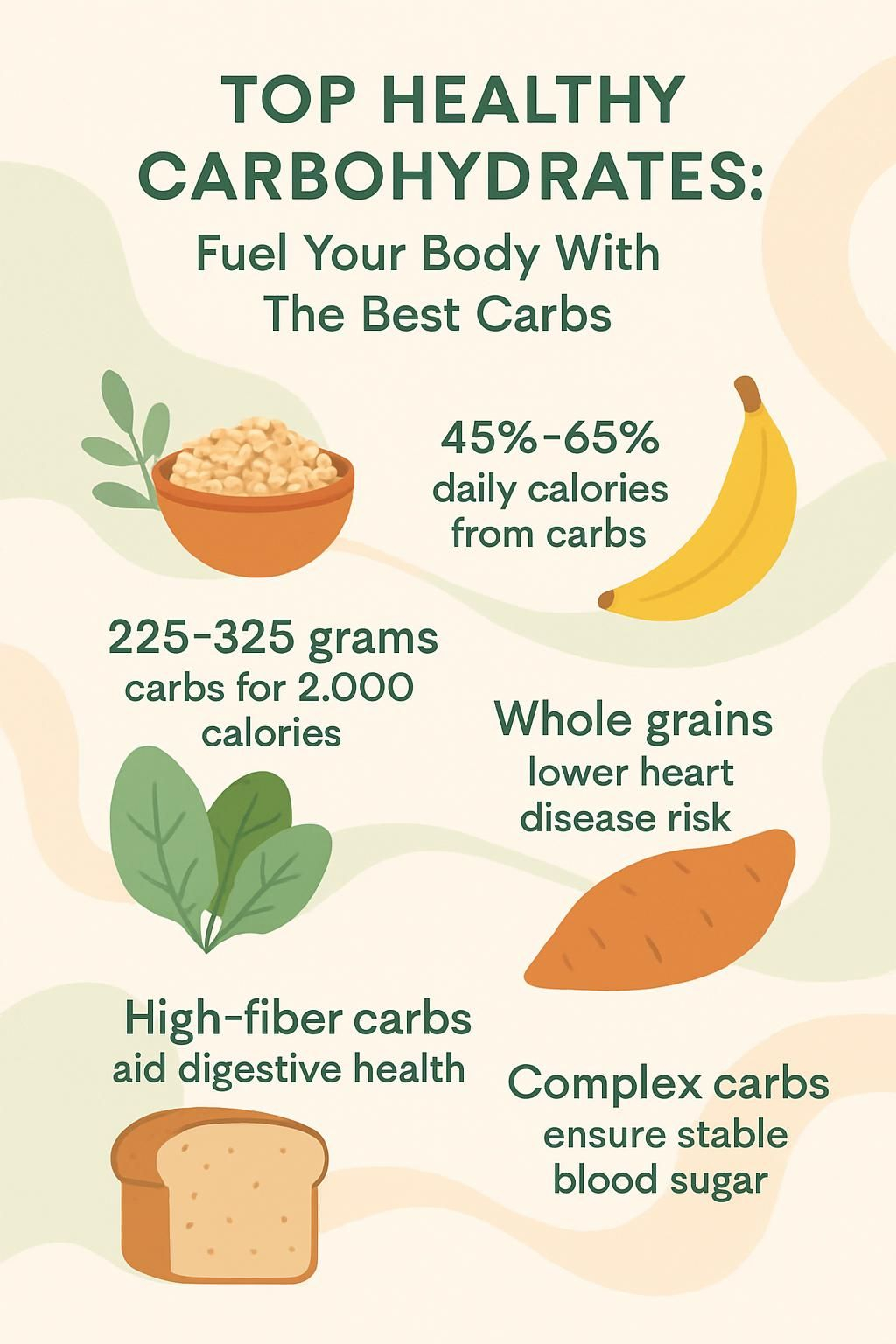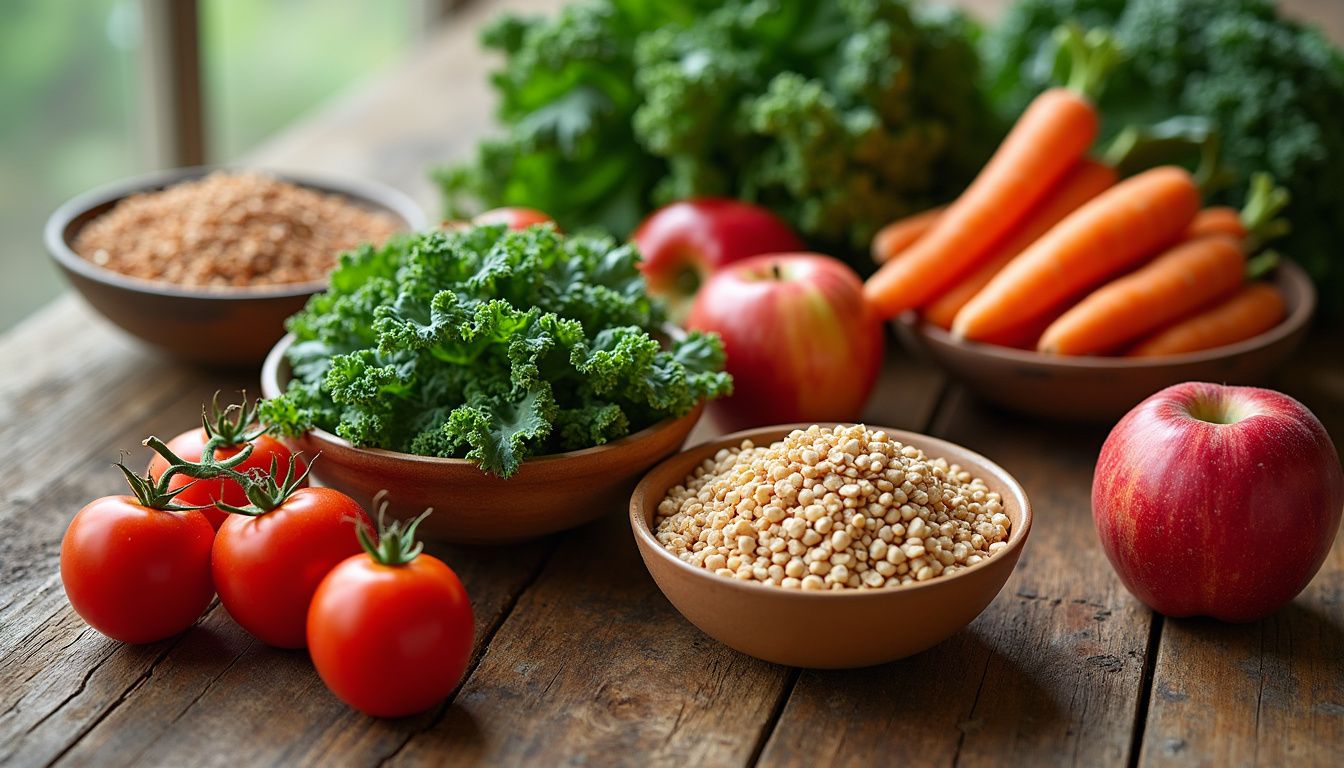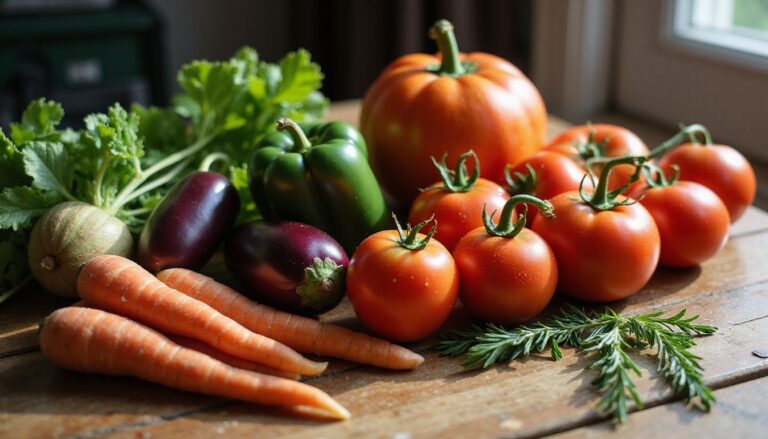Top Healthy Carbohydrates: Fuel Your Body With The Best Carbs
Our Nutrition Assistant AI Suite will transform your body. You will lose fat, get toned, and build muscle. Gain confidence and optimal health.
Choosing healthy carbs can feel confusing. The good news is that smart choices are simple once you know what to look for. Swapping in wholesome carbohydrate foods can lift energy, steady blood sugar, and support a balanced diet.
Research links more whole grains, beans, fruit, and vegetables with a lower risk of heart disease and type 2 diabetes. In this guide, I explain how to pick the best carbohydrate sources, why they are good for you, which high carb foods deserve space on your plate, and simple ways to start counting carbs without stress.
Here is how to fuel your body with carbs that work for you today.
Key Takeaways
- The Dietary Guidelines for Americans suggest 45% to 65% of daily calories from carbohydrates, about 225 to 325 grams on a 2,000 calorie plan.
- Studies from Harvard T.H. Chan School of Public Health link higher intakes of whole grains, legumes, fruit, and vegetables with lower risks of heart disease and type 2 diabetes.
- Complex carbs in oats, brown rice, quinoa, legumes, and starchy vegetables release glucose slowly, supporting steady energy and stable blood sugar.
- High fiber foods such as beans and whole grains help digestion and can lower LDL cholesterol, the type tied to cardiovascular disease risk.
- Minimally processed carbohydrate foods deliver fiber, B vitamins, potassium, magnesium, iron, antioxidants, and plant protein in one package.

What Are Healthy Carbohydrates and Why Do They Matter?

Healthy carbohydrates are the body’s main fuel. I choose them to power my day, support a healthy diet, and keep energy even from meal to meal.
What Are Carbohydrates and Their Role in Nutrition?
Carbohydrates are nutrients that your body breaks into glucose, the basic fuel for your brain and muscles. Foods high in carbohydrates include whole wheat bread, brown rice, starchy vegetables, legumes, and fruit such as apples and bananas.
The Dietary Guidelines for Americans recommend 45% to 65% of daily calories from carbs. On a 2,000 calorie diet, that equals about 225 to 325 grams of carbohydrates.
I think of carbs as my fuel tank. The right mix helps me power through work and workouts.
There are three main types: sugars, starches, and fiber. Sugars and starches supply energy. Fiber is a carbohydrate your body cannot digest, which helps control blood sugar and supports digestion.
How Do Simple and Complex Carbohydrates Differ?
Simple carbs are small sugar units that digest fast. Table sugar, honey, soda, white bread, and pastries raise blood sugar quickly and then it drops.
Complex carbs have long chains of sugars. Whole wheat pasta, brown rice, oats, quinoa, beans, peas, corn, and sweet potatoes digest more slowly. They often include fiber, which helps me feel full and supports a steady flow of energy.
Knowing this difference helps me choose carbs that keep me going instead of causing a quick spike and crash.
Key Benefits of Eating Healthy Carbohydrates
Healthy carbs do more than fill you up. The right amount at each meal supports steady energy, sharp focus, and long-term health.
How Do Carbs Provide Lasting Energy?
Complex carbohydrates break down slowly into glucose. Oatmeal, whole grain bread, and porridge release energy over time instead of all at once. This helps prevent sudden blood sugar swings.
High fiber foods also slow digestion. Beans and lentils add protein and fiber, which keeps me comfortable and focused for hours. A bowl of oats with milk or yogurt often carries me through a busy morning.
Can Healthy Carbs Help Regulate Blood Sugar?
Yes. Whole grains, beans, and starchy vegetables digest at a steady pace, which supports stable blood glucose. One serving of oatmeal has about 27 grams of carbohydrates and around 3 to 4 grams of fiber. That mix helps control blood sugar.
People with diabetes often track carb intake and favor lower glycemic foods. Swapping white pasta for brown rice or adding more legumes improved my meals without hurting taste. If you manage diabetes or a medical condition, talk with a registered dietitian or your healthcare provider for a plan that fits you.
How Do Carbs Support Heart Health?
Fiber-rich carbs like oats, beans, and whole grains can reduce LDL cholesterol, the type linked to heart disease. Vegetables, brown rice, and fruit also supply potassium and B vitamins that support a healthy heart rhythm and blood pressure.
Replacing refined sweets and white flour products with oatmeal bakes, bean salads, or whole grain sides made a clear difference for me over time. Choosing nutrient-dense carbs is a heart smart move.
What Are the Effects of Carbs on Digestive Health?
Fiber supports the gut. It adds bulk that helps food move through the large intestine and promotes regularity. Fiber also feeds helpful gut bacteria that make short-chain fatty acids, which may lower inflammation and support colon health.
Barley and oats provide both soluble and insoluble fiber. Diets higher in complex carbohydrates and lower in refined grains are linked with less constipation and better long-term digestive health.
Which Essential Nutrients Come from Carbohydrates?
Whole carb foods deliver more than calories. Whole grains, fruit, vegetables, and legumes provide fiber, vitamin C, B vitamins, iron, potassium, magnesium, and antioxidants. Some leafy greens also add plant-based calcium.
Choosing unprocessed carb foods helps me meet daily nutrient needs. For example, bananas supply potassium, oats add magnesium, and starchy vegetables provide vitamin B6. Nuts and seeds contribute protein and helpful micronutrients along with their carbs.
Top Sources of Healthy Carbohydrates to Include in Your Diet
Many everyday foods offer healthy carbohydrates plus key vitamins and minerals. Picking the right sources supports a balanced diet and reliable energy.
Whole Grains That Boost Nutrition
- Choose brown rice, oats, quinoa, and barley to increase fiber and support digestion.
- Whole wheat bread or pasta has more B vitamins and iron than white flour versions.
- Oats at breakfast help regulate blood sugar and provide long-lasting energy.
- Quinoa is a complete protein, which means it contains all nine essential amino acids.
- Buckwheat adds magnesium and supports heart health, and it is naturally gluten free.
- Replace white rice with brown or wild rice to raise mineral intake with familiar flavor.
- Check the ingredient list for the word whole before the grain name to confirm it is a whole grain.
- Whole grains release glucose slowly, which helps with carb counting and steady energy.
- Air-popped popcorn is a whole grain snack with fiber when made without extra butter or sugar.
Why Is Brown Rice a Healthy Choice?
Brown rice keeps its bran and germ, so it provides more fiber, B vitamins, magnesium, iron, and antioxidants than white rice. That fiber slows digestion and helps keep me full longer.
A half-cup serving has about 108 calories, over 1 gram of fiber, and roughly 2 grams of protein. It pairs well with beans or lean meats and keeps blood sugar steadier than refined grains.
What Are the Health Benefits of Quinoa?
Quinoa offers a strong mix of protein and fiber. One cup cooked has about 8 grams of protein and 5 grams of fiber plus iron, magnesium, and potassium. It is gluten free and provides all nine essential amino acids.
I use quinoa in salads or grain bowls because it helps regulate blood sugar and keeps meals satisfying. Research links higher whole grain intake with lower risk of chronic disease.
Source: Harvard T.H. Chan School of Public Health, Carbohydrates.
How Do Oats Provide Sustained Energy?
Oats contain complex carbs and beta glucan fiber that slow the release of glucose. A half-cup of rolled oats supplies about 27 grams of carbs and 4 grams of fiber.
Oatmeal with milk keeps me full longer than toast or pastries. The fiber helps regulate blood sugar so I avoid a quick spike and crash.
Is Buckwheat a Good Source of Healthy Carbs?
Buckwheat, often found in pancakes and soba noodles, provides slow-digesting complex carbs for steady energy. One cup cooked has about 33 grams of carbs, 3 grams of fiber, and almost 6 grams of protein.
It also contains magnesium, iron, zinc, and manganese. Buckwheat is gluten free, so people with celiac disease can include it. I like its nutty flavor in both savory dishes and simple baked goods.
Nutritional Value of Starchy Vegetables
- Sweet potatoes provide vitamin A, potassium, and fiber, and they are lower on the glycemic index than regular potatoes.
- Regular potatoes offer potassium, vitamin C, and B6, plus resistant starch that supports a healthy gut.
- Corn supplies water, fiber, B vitamins, and antioxidants like lutein that support eye health.
- Beets contain folate, manganese, and iron, and natural nitrates that may aid blood flow.
- Green peas deliver protein, fiber, and minerals such as magnesium and iron, with good shelf life.
These vegetables are easy to add as sides or in soups, which makes eating enough carbs simpler.
What Makes Sweet Potatoes a Healthy Carb?
Sweet potatoes are rich in complex carbohydrates that digest slowly and help keep blood sugar steady. One cup baked has about 180 calories, 41 grams of carbs, and 7 grams of fiber.
They also supply potassium, magnesium, and vitamins A and C. Their natural sweetness comes from simple sugars called monosaccharides, not added sugar. The fiber helps with fullness, which supports weight management goals.
Are Potatoes Beneficial for Health?
Yes, when prepared simply. A medium baked potato with skin has about 26 grams of carbohydrates and more than 2 grams of fiber. It delivers potassium, vitamin C, and vitamin B6 with almost no sodium or fat.
I bake potatoes or add them to soup to get complex carbs for energy. Keeping the skin boosts fiber compared with peeled options or processed snacks.
How Is Corn Considered a Healthy Carb?
Corn provides complex carbs plus fiber for steady energy. One ear has about 3 grams of fiber along with magnesium and potassium.
It also contains lutein and zeaxanthin, antioxidants that support eye health. I often add whole-kernel corn to salads or chili to raise fiber without extra sugar.
What Health Benefits Do Beets Offer?
Beets are high in fiber, which supports digestion and fullness. One cup cooked has about 3.6 grams of fiber and 59 calories. Beets also provide potassium, manganese, and folate that support heart health and blood pressure.
Natural nitrates in beets may improve blood flow during exercise. I like them roasted in salads for color and nutrition.
Source: Jones AM, Thompson C, et al. Sports Med, 2014, dietary nitrate and exercise performance.
Nutrient-Packed Legumes and Pulses
- Lentils are rich in protein and fiber. One cup cooked has about 18 grams of protein.
- Kidney beans release carbs slowly and provide potassium for heart health.
- Chickpeas supply protein, fiber, iron, and magnesium for steady energy.
- Black beans offer folate and antioxidants along with complex carbohydrates.
- Green peas add vitamin C and B vitamins and work well in salads or soups.
- Pinto beans provide soluble fiber that can help lower LDL cholesterol.
- Edamame offers plant protein with complex carbs and is easy to snack on.
- Mung beans deliver potassium, magnesium, and iron with very little fat.
What Are the Benefits of Eating Beans?
Beans are high in fiber and plant protein. Their carbs break down slowly, which supports steady energy and blood sugar control.
They also supply B vitamins, potassium, iron, and magnesium. Regular bean intake is linked with lower cholesterol and reduced heart disease risk.
Why Choose Lentils for Healthy Carbs?
Lentils cook quickly and work in many dishes. One cup cooked has about 40 grams of carbohydrates, with a large share from fiber.
They supply iron, folate, potassium, and protein with very little fat. I add lentils to soups or salads for comfort, nutrition, and lasting energy.
What Nutrients Do Chickpeas Provide?
Chickpeas offer a helpful mix of protein and fiber. One cup cooked supplies about 15 grams of protein and 12 grams of fiber, which supports fullness and steady blood sugar.
They also contain iron, magnesium, potassium, zinc, folate, phosphorus, copper, vitamin B6, and some calcium. I keep canned chickpeas on hand for quick salads and soups.
Healthy Fruits That Are Great Carb Sources
- Bananas, about 27 grams of carbs each, supply quick energy and potassium. I like one before a workout.
- Oranges provide about 15 grams of carbs and lots of vitamin C. Pulp adds fiber.
- Apples offer about 25 grams of carbs plus soluble and insoluble fiber that helps fullness.
- Berries give antioxidants and 11 to 21 grams of carbs per cup with helpful fiber.
- Grapes supply fast-acting sugars and hydration at about 16 grams of carbs per cup.
- Pears have around 28 grams of carbs and high water content, which makes them satisfying.
- Mangoes offer vitamin C and beta carotene with about 25 grams of carbs per cup.
- Pineapple provides enzymes and about 21 grams of carbohydrates per cup.
- Kiwis contain about 15 grams of carbs each plus vitamin C. You can eat the skin if washed well.
These fruits add natural sweetness, fiber, and vitamins that help balance a meal rich in healthy carbohydrates.
How Do Bananas Support Health?
Bananas pair quick natural sugars with fiber, which helps steady blood sugar. A medium banana has about 27 grams of carbs and 3 grams of fiber.
They also provide potassium for blood pressure and muscle function. I enjoy one after exercise to replace minerals quickly.
Are Apples a Good Source of Carbs?
Yes. A medium apple provides roughly 25 grams of carbohydrates from natural sugars and fiber. The fiber slows absorption, so energy lasts longer.
Apples add vitamin C and potassium with no fat or cholesterol. I like one in the afternoon to tide me over to dinner.
What Nutrients Are Found in Berries?
Berries such as strawberries, blueberries, raspberries, and blackberries are rich in fiber and antioxidants. A cup of strawberries has about 3 grams of fiber and over 140 percent of the daily value for vitamin C.
Berries are low in calories and provide vitamin K and manganese. Research highlights the antioxidant power of blueberries in particular.
Why Include Oranges as Healthy Carbs?
Oranges supply about 15 grams of carbohydrates per medium fruit, mostly from natural sugars and fiber. They also provide vitamin C, potassium, folate, and helpful plant compounds.
Fiber slows sugar absorption, which supports steady blood sugar. Their high water content hydrates while adding bright flavor to snacks and salads.
Dairy Products That Contain Carbohydrates
- Milk has about 12 grams of carbs per cup from lactose, plus calcium and vitamin D.
- Yogurt offers 10 to 18 grams of carbs per cup, with protein and probiotics in plain or Greek styles.
- Cottage cheese contains about 6 grams of carbs per cup. Adding fruit raises carbs and vitamins.
- Kefir provides around 7 to 8 grams of carbs per cup and supports gut health with probiotics.
- Cheeses like mozzarella or Swiss have fewer than 2 grams of carbs per ounce.
- Lactose-free milk has similar carb content to regular milk for those who are intolerant.
- Flavored milks and yogurts often contain added sugar, so check the label.
How Does Milk Provide Healthy Carbs?
Milk contains lactose, a natural sugar that digests more slowly than table sugar. A cup of milk supplies about 12 grams of carbohydrates, which can support steady blood glucose after meals.
I use milk in oatmeal or smoothies to get protein, calcium, vitamin D, and healthy carbs at the same time. Choose low fat or fat free if that fits your goals.
Is Yogurt a Good Carb Source?
Plain low fat yogurt has about 12 grams of carbohydrates per cup, mostly from lactose. Greek yogurt is higher in protein with about 6 to 8 grams of carbs per serving.
Picking unsweetened yogurt prevents extra added sugar. I add fruit or nuts for flavor and texture along with balanced nutrition.
Nuts and Seeds With Carbohydrate Benefits
- Almonds have about 6 grams of carbs per ounce and supply heart friendly fats.
- Chia seeds provide about 12 grams of carbs per ounce, mostly from fiber that supports blood sugar control.
- Pumpkin seeds contain around 4 grams of carbs per ounce plus magnesium and zinc.
- Sunflower seeds offer about 6 grams of carbs per ounce and vitamin E.
- Walnuts provide about 4 grams of carbs per ounce and omega 3 fats for brain support.
- Flaxseeds add about 8 grams of carbs per ounce with omega 3 fats that can aid cholesterol control.
- Cashews supply about 9 grams of carbohydrates per ounce with a creamy texture for snacks.
- Pecans have about 4 grams of carbs per ounce and protective plant compounds.
Are Almonds Considered Healthy Carbohydrates?
Almonds contain some carbs, but they are better known for healthy fats, protein, and fiber. One ounce has about 6 grams of carbs, including about 3.5 grams of fiber that slows sugar absorption.
I add sliced almonds to oatmeal for crunch and extra nutrients like vitamin E and magnesium.
What Are the Benefits of Chia Seeds?
Chia seeds are packed with fiber. Per 100 grams, they provide about 42 grams of carbohydrates, most of it fiber, which supports digestion and fullness.
Two tablespoons offer nearly 10 grams of dietary fiber plus omega 3 fats, protein, calcium, magnesium, and antioxidants. They absorb water and thicken foods, which may help steady blood sugar. I stir them into yogurt or oats for an easy nutrition boost.
Source: USDA FoodData Central and peer reviewed fiber research.
Which Unhealthy Carbohydrates Should You Avoid?
Some carb choices work against your health goals. Knowing which ones to limit helps you make smart swaps that stick.
Why Are Refined Grains Harmful?
Refined grains lose fiber, vitamins, and minerals during processing. White bread, white rice, and regular pasta digest quickly and can spike blood sugar, which then drops and leaves you hungry.
Higher intakes of refined grains are linked with weight gain and type 2 diabetes. Switching to whole grain options keeps my energy steadier and my meals more filling.
What Health Risks Come from Sugary Drinks?
Sugary drinks raise the risk of weight gain, type 2 diabetes, heart disease, and tooth decay. Even one can of soda per day is linked with a higher chance of diabetes in large studies.
Many packaged foods also contain hidden sugars. Reading labels helped me cut back and avoid spikes in blood sugar after meals.
Why Avoid Processed Snack Foods?
Chips, cookies, and other processed snacks often contain added sugar, unhealthy fats, and sodium with little fiber. They give quick energy that fades fast.
I used to grab chips during long afternoons. I felt sluggish soon after and hungrier later. Whole food snacks like fruit, yogurt, or nuts keep me full longer without the crash.
How Can You Incorporate Healthy Carbohydrates Into Your Diet?
I plan meals around whole food carb sources for steady energy and fewer cravings. Small changes add up fast.
Why Choose Whole and Unprocessed Carb Sources?
Whole and unprocessed carbs keep their natural fiber, vitamins, and minerals. Brown rice, oats, whole wheat bread, fruit, sweet potatoes, and beans supply steady energy and support weight management.
Research from the American Heart Association links higher whole grain intake with lower heart disease risk. I saw fewer energy dips after switching from white bread to whole grain choices.
How to Read Nutrition Labels for Hidden Sugars?
Scan the ingredient list for added sugars such as cane sugar, maltose, dextrose, corn syrup, and fruit juice concentrate. If these appear near the top, the product likely contains a lot of added sugar.
Compare total sugars per serving and watch serving sizes. Choosing foods with little or no added sugar helps keep blood sugar in check and avoids extra calories.
Why Combine Carbohydrates with Proteins and Fats?
Pairing carbs with protein and healthy fats slows sugar absorption and helps prevent energy crashes. This mix supports fullness and a more even insulin response.
For example, oatmeal with almond butter or Greek yogurt with berries keeps me fueled longer than carbs alone. Aim to include a source of protein and fat with carbohydrate foods at most meals.
Conclusion
Healthy carbs can power your day while supporting heart health, digestion, and stable blood sugar. Whole grains, fruit, vegetables, legumes, nuts, seeds, and dairy provide fiber and key vitamins and minerals in forms your body can use.
After I moved from refined carbs to whole food choices, my energy and focus improved. Research from Harvard T.H. Chan School of Public Health aligns with this approach. Keep foods close to their natural state and you will get the best from every carbohydrate you eat. If you have a medical condition or manage diabetes, consult a healthcare professional for personal guidance.
FAQs
1. What are the top healthy carbohydrates for fueling the body?
Whole grains, such as brown rice and oats, provide steady energy and contain fiber that supports digestion. Legumes like lentils offer protein along with complex carbs. Starchy vegetables, including sweet potatoes and squash, supply vitamins and minerals while keeping blood sugar stable.
2. How do healthy carbohydrates support physical activity?
Complex carbohydrates from foods like whole wheat bread or beans break down slowly in the body. This slow release of glucose helps maintain energy during exercise or daily tasks without causing sharp spikes in blood sugar levels.
3. Are all carbohydrates equally nutritious?
Not all carbohydrate sources have equal nutritional value. Whole food options such as quinoa or barley retain more nutrients than refined products like white bread or pastries; these processed items often lose fiber and key vitamins during manufacturing.
4. Can you share a personal example of choosing better carbs?
After switching from instant noodles to brown rice at lunch, I noticed fewer afternoon crashes and improved focus at work. Choosing nutrient-rich carbs made meals more satisfying while supporting my overall health goals.
Summary: Healthy carbohydrate choices include whole grains, legumes, and starchy vegetables; they deliver lasting energy plus important nutrients for both active lifestyles and general well-being.







